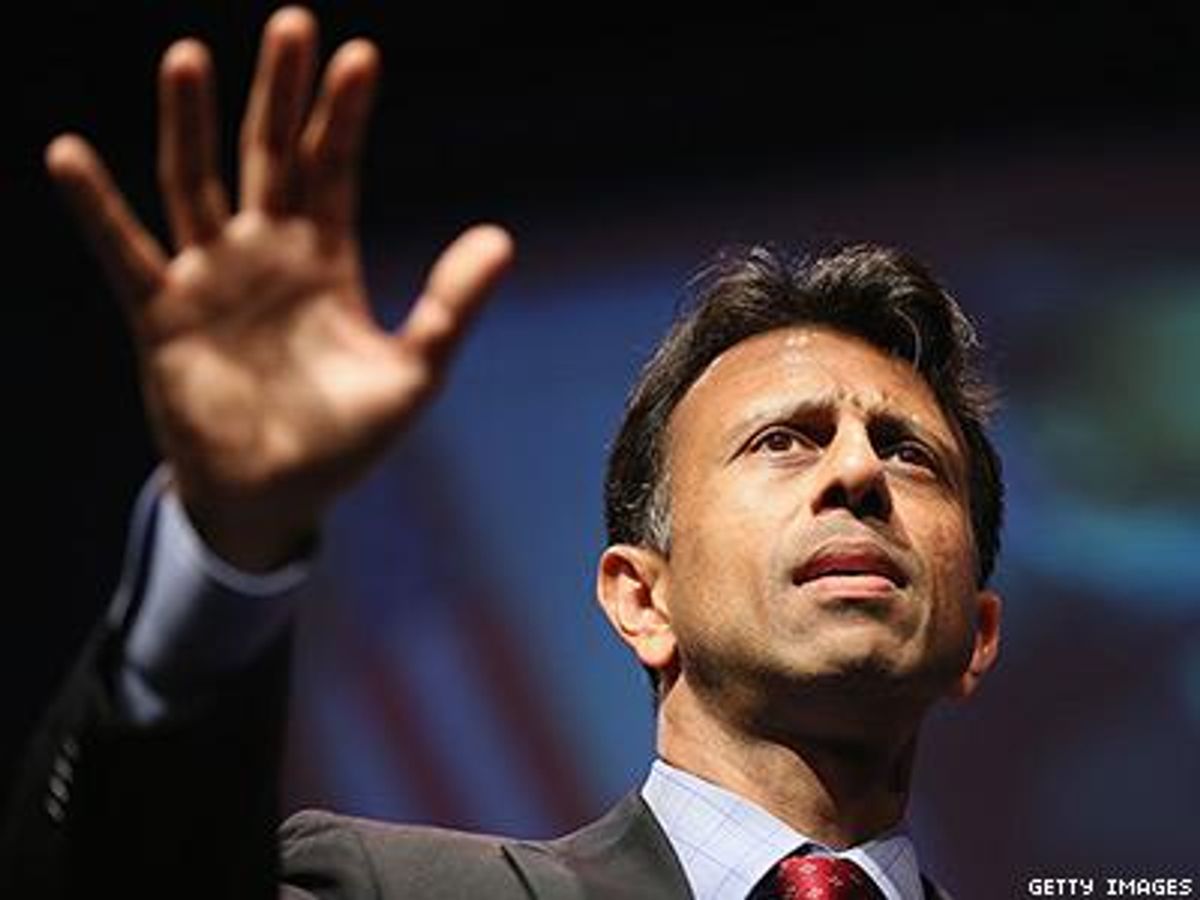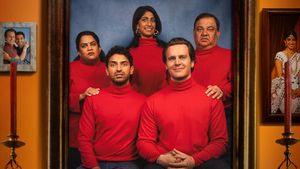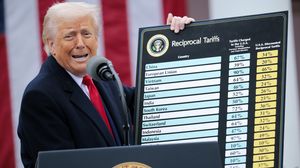In his officially unofficial quest for the Republican presidential nomination, Louisiana Gov. Bobby Jindal has positioned himself as an unwavering champion for liberty. Back in his home state, Jindal's rhetoric has rung hollow, particularly for LGBT people. Just last month, Jindal took to The New York Times' opinion page and vowed to succeed where he claims Republican governors in Arkansas and Indiana have failed: He will not bow to "the shrieks of big business and the radical left" who oppose so-called religious freedom laws. Religious freedom laws purportedly prevent government from intruding on business owners' exercise of their religious beliefs. In reality, the laws are licenses to discriminate against LGBT citizens.
Just this year, more than a dozen states have proposed religious freedom laws. Louisiana's Marriage and Conscience Act is one of the most sweeping. According to Jindal and Republican state Rep. Mike Johnson, who sponsored the bill, the act will merely protect religious liberty in Louisiana. But others say the bill will stigmatize same-sex couples, allow employers to deny benefits to same-sex spouses, and permit licensed professionals to deny services to LGBT people . IBM sent Jindal a letter opposing the bill, saying it "legally protects discrimination" against same-sex couples and will "create a hostile environment."
In promoting the Marriage and Conscience Act, Jindal and his allies make it sound as if religious liberty in Louisiana is under attack. On the ground, the situation could not be more different. Louisiana's LGBT populace is losing at every turn.
During the 2014 legislative session, for example, lawmakers proposed a bill to remove sodomy from the state's list of crimes against nature. Although still on the books, the antisodomy provision had been rendered unconstitutional by the Supreme Court's 2003 Lawrence v. Texas decision. Nevertheless, East Baton Rouge Parish sheriff's deputies from 2011 until 2013 set up gay sex stings to enforce the unconstitutional law. Police rounded up at least a dozen alleged gay men. According to the sheriff's office, "Whether the law is valid ... the sheriff will enforce the laws that are enacted." Thus, in Louisiana's state capital, being gay remained an arrestable offense long after the district attorney could not lawfully pursue charges.
Jindal stayed silent as the Louisiana House of Representatives debated whether to repeal the unconstitutional law and protect LGBT rights. The repeal failed by a vote of 67-27. Predictably, some police officers have continued enforcing Louisiana's antisodomy law. Jindal's yelp for liberty apparently does not extend to the "liberty ... [of] adult persons in deciding how to conduct their private lives in matters pertaining to sex," which the Supreme Court so forcefully protected in Lawrence.
Last year's 67 votes against repealing Louisiana's unconstitutional antisodomy law came from many of the same legislators who today proclaim that Louisiana needs a new law to protect religious rights. The irony cannot be missed.
Louisiana's proposed Marriage and Conscience Act attacks a straw man. Religious liberty is not under attack in Louisiana. Quite the opposite. Louisiana's employment law protects religion but allows employers to fire employees solely because of their sexual orientation or gender identity. Last year state Rep. Karen St. Germain proposed employment protections for LBGT workers but felt forced to withdraw the bill after the antisodomy repeal debate devolved into what she described as "stupidity." A similar bill to protect LGBT people against discrimination failed, with a representative of the powerful Louisiana Family Forum testifying that allowing discrimination against LGBT people in housing decisions is "rational" since landlords may have "closely held" religious beliefs that prevent them from doing business with LGBT people.
Only a few months after Louisiana's LGBT residents suffered defeat in the state legislature, Louisiana became the first state to have its same-sex marriage ban upheld in federal court since the 2013 Supreme Court ruling that gutted the Defense of Marriage Act. In that case, Robicheaux v. Caldwell,U.S. District Judge Martin Feldman justified his ruling in part by equating same-sex marriage with pedophilia and incest. Last month the Tulane Law Review named Judge Feldman Alumnus of the Year. In a speech at the award celebration in New Orleans, U.S. Supreme Court Justice Antonin Scalia commended Feldman for having the "moral courage" to stand against marriage equality, according to Tulane Law Review alumni who attended.
The facts are clear. Louisiana's religious liberty is not under attack, but LGBT liberty is. When Jindal and his allies claim otherwise, they are being disingenuous at best. Louisiana's proposed Marriage and Conscience Act, like similar proposals in other Republican-dominated states, is not a vanguard for liberty. It is nothing more than another bullying tactic to ensure that LGBT people never feel safe enough to challenge the status quo. If passed, the law will do nothing more than stamp a permanent badge of inferiority on same-sex couples.
 R. KYLE ALAGOOD is a law student at the Louisiana State University Law Center and a former research associate at the Brennan Center for Justice. His writing has appeared in The National Law Journal, The Huffington Post, The Courier-Journal of Louisville, Ky., and a variety of regional newspapers.
R. KYLE ALAGOOD is a law student at the Louisiana State University Law Center and a former research associate at the Brennan Center for Justice. His writing has appeared in The National Law Journal, The Huffington Post, The Courier-Journal of Louisville, Ky., and a variety of regional newspapers.
































 R. KYLE ALAGOOD is a law student at the Louisiana State University Law Center and a former research associate at the Brennan Center for Justice. His writing has appeared in The National Law Journal, The Huffington Post, The Courier-Journal of Louisville, Ky., and a variety of regional newspapers.
R. KYLE ALAGOOD is a law student at the Louisiana State University Law Center and a former research associate at the Brennan Center for Justice. His writing has appeared in The National Law Journal, The Huffington Post, The Courier-Journal of Louisville, Ky., and a variety of regional newspapers. 

















































